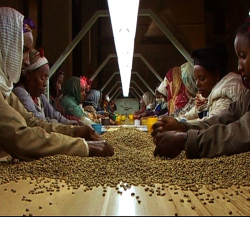Exposé Details Coffee Cartel’s Exploitation of Ethiopians

In Ethiopia, where coffee originated, over 15 million people are dependent on this aromatic bean for their very survival. In fact, the country generates about 67% of its total revenues via exports of this coveted commodity. So, with such multi-national corporations as Kraft, Nestle, Procter & Gamble, and Sara Lee competing in this $80 billion-dollar industry, one would think that the farmers would be able to demand a fair price for what they produce.Tragically, this is not the case, as eloquently explained in Black Gold, a perplexing expose’ documentary directed by Nick and Marc Francis.
What these brothers found was that while companies like Starbucks are reaping record profits, none of the benefits of coffee’s skyrocketing popularity has trickled down to the farmers trying to eke out a living in cash-strapped Ethiopia.
The picture points out that they are paid 23 cents a kilo for their coffee, which ultimate sells for about $230 per kilo, a figure arrived at by translating the $3/cup rate charged by the upscale retail outlets. All the profits from this tremendous mark-up benefits the aforementioned cartel which sets the international price for coffee, the world’s 2nd most actively traded commodity (behind oil), in New York and London.Meanwhile, in Ethiopia, the average worker in the coffee industry earns 50 cents a day for their grueling work, whether in the sweltering fields or in a fetid factory. The film amply illustrates that this meager salary is barely enough to subsist on, as family providers frequently find themselves having to choose between spending money on food, clean water, shelter, clothing or education for their children.There is a touching scene in Black Gold where we see Ethiopians earnestly engaged in a prayer ritual begging God to raise the praise of coffee.
This tableau the directors cleverly offset with telling interviews in which clueless consumers living far away in the lap of luxury in la-la land acknowledge having no clue about the desperate plight of the folks who farmed the beans for the brew they’re enjoying.The premise powerfully postulated by Black Gold is that not only Ethiopians, but millions and millions of other Africans are also suffering due to the paltry prices paid by big business for natural resources which most people from developed countries take for granted. Africa is already the only continent to grow poorer over the past 20 years, so the urgent message which must be heeded is that until the West becomes willing to pay fair prices, the rape of the continent will continue unabated, leaving vast populations in economic crisis, stranded and seemingly without recourse in increasingly dire straits.






Comments powered by CComment